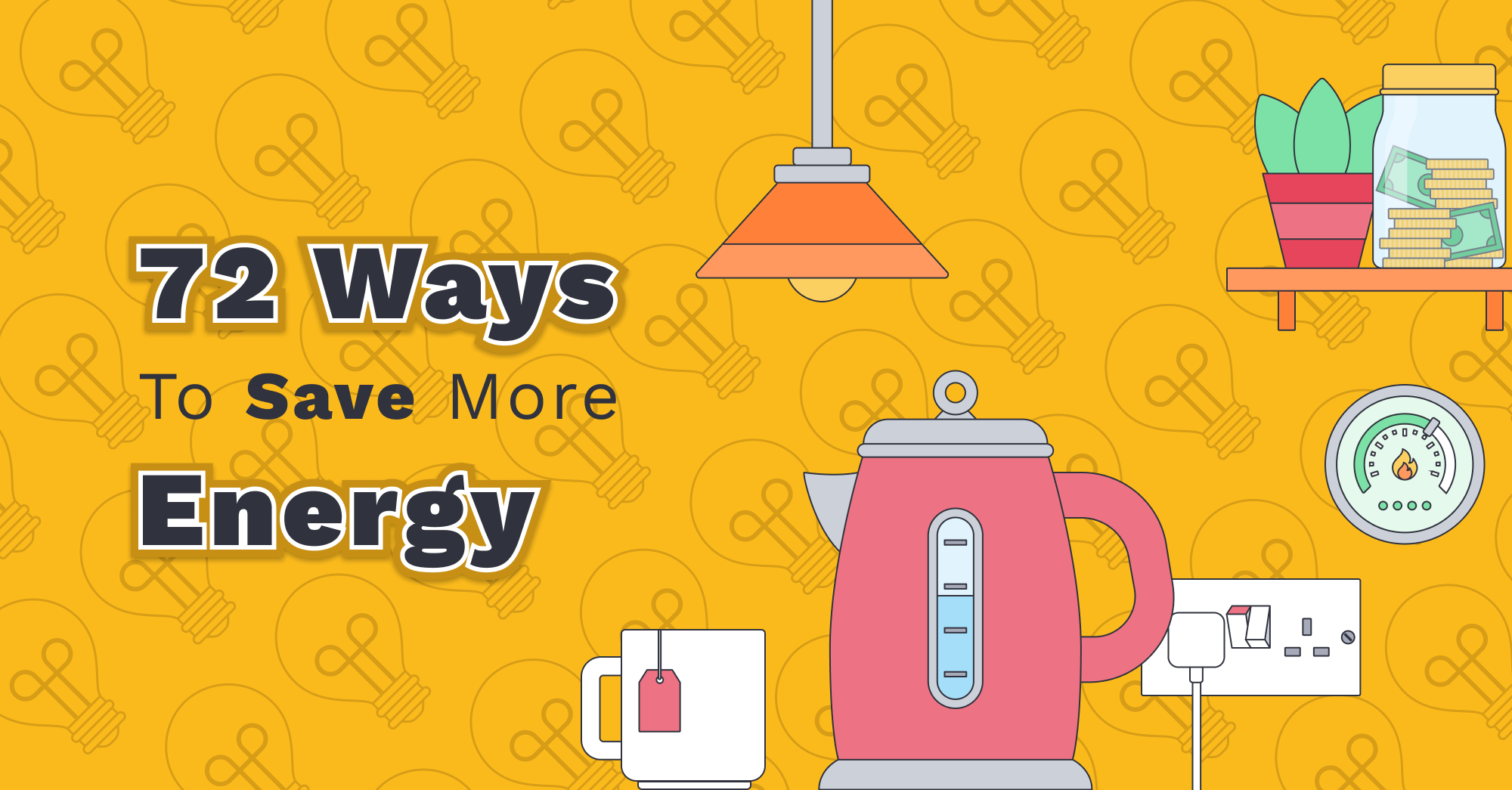Wintertime brings with it many joys: fairy lights, Christmas trees, cinnamon-spiced coffees and cranberry-scented candles. That being said, it can also be a time of stress and concern about personal finances.
Energy costs, in particular, make up a greater proportion of your monthly budget during this season than any other time of the year.
We use our lights for longer, our heating more often, and our indoor activities—such as watching Christmas movies, catching up on Netflix, playing video games, or listening to music—typically require additional energy, too. Even in the kitchen we might boil our kettle more frequently for warming cups of tea, or gravitate towards hot meals as opposed to chopped salads and sandwiches.
That’s why the winter is an important time to be careful about our energy usage and do our best to find ways of reducing our consumption where possible. That means shaving off power usage where it is unnecessary, and making sure we keep our heat in our homes for as long as possible.
We asked our email subscribers to tell us their own tips and tricks for cutting back on energy costs, and from their helpful responses, we have been able to put together this article—crammed pack with ideas for reducing your energy usage this winter.
Read them here:
Staying warm
When at home, it’s important to keep your thermostat at a minimum 18C to your body well. If this feels a little chilly, you can use a few other tips to make this level of warmth go further.
1. If your thermostat is sitting above 18C, try turning it down by just 1C. You can always turn it up again if you find it uncomfortable!
2. Dress warmly while at home, with thick layers and woolly socks.
3. Add a blanket layer to your legs to increase your personal insulation.
4. Try warming drinks as opposed to cool ones, such as hot coffee instead of iced, and hot water with orange squash instead of tap water.
5. A lot of heat can be lost through our heads, too, so wearing snoods, hoodies and other cosy additions like this can help you stay toasty during the day.
Insulating the home
6. In the evening, when it is already dark, close your curtains to reduce heat loss through your windows.
7. In the daytime, however, allow the sun (and its natural heat!) into the room.
8. If you notice draughts under doors, plug these spaces with draught excluders. If you don’t have one of these, a thick bath towel will do the same job.
9. A low cost fix to leaky windows and doors is insulation strips. They simply stick around these spaces and help keep your heat inside your house—all for around £5.
10. Adding carpets and rugs to your rooms can help insulate your home, too.
11. If you are not using your chimney, consider blocking it up and prevent heating escaping this way.
Making the most of what you have
12. Turn off devices you are not using such as the television at the plug.
13. Turn off your phone, laptop or other portable item after it has finished charging.
14. Try not to charge your phone overnight. Most modern phones do not need 8 hours to recharge fully, so most of the time it is plugged in is wasting small amounts of energy.
15. Thermal sheets behind radiators can help reflect the heat back into the room and make your usage go further.
16. Turn your boiler temperature down to around 55 to 60 degrees
17. Consider using smart plugs or timer lighting so that you can have appliances and lights turn off at set times everyday. This allows you to, for example, have your porch light turn on just before you come home from work, rather than staying on all day.
18. Better yet, if you have smart plugs you can link them to an app on your phone, allowing you to easily switch them on or off, or even check that you have done so.
19. Have your boiler serviced regularly to make sure it is working efficiently.
20. Save more heat by adding a boiler jacket to your boiler.
21. Instead of spending the day indoors, you could try getting outside for a wintery walk. This is not only great for our health, but easy on our energy consumption, too.
22. Invest in a smart thermostat to see how much energy you are using and figure out where you could cut back.
Bathing
23. Shorten your showers to about 4-5 minutes.
24. Try to do personal grooming outside the shower or with the water off to cut back on energy too.
25. If you want to indulge or have a longer wash, try the bath. It uses more water and energy than a 5 minute shower, but less than a 20 minute shower.
26. You can also consider investing in an energy-efficient shower head (around £15). These restrict the use of water without compromising on pressure strength, for quality showers with less water and energy.
27. You can save some more heat by washing your hands or face with cold water.
28. Where possible, allow your hair to air dry as opposed to using the hair dryer.
29. You can even try simply washing your hair and then completely the rest of your morning routine before using the hairdryer. This will allow your hair to air dry partly and reduce your time with the dryer, rather than eliminating it completely.
30. You can also use a cooler setting or “eco mode” on your hairdryer.
Cleaning
31. Wash your clothes at cooler temperatures.
32. Wash using a full load, instead of only washing a few items at a time.
33. Avoid over packing your washing machine as your clothes are unlikely to be washed properly.
34. If applicable, choose a high-speed spin cycle on your washing machine, as this helps to remove more moisture from your clothing before it comes out.
35. Separate clothing for drying. Heavy cottons, for instance, will dry much slower, and will keep your other lighter items damp for longer, too.
36. Try using dryer balls.
37. Use the low heat setting on your dryer.
38. Air dry clothes where possible.
39. When using the tumble dryer, clear out the filter to maintain efficiency.
40. Avoid hanging wet clothes over your radiator as it reduces the heat circulation in the room and can encourage mould growth.
41. On hard surfaces, try brushing up dirt and dust before hoovering it up. This reduces the time you use the hoover.
42. Make sure you empty the hoover and don’t overfill it. This reduces its efficiency.
43. Dust your radiators to allow heat to move freely.
44. If you have one, use your dishwater as opposed to hand washing your dishes. The dishwasher is much more efficient than using our sink and lots of hot water.
45. When using the dishwasher, make sure it is full before turning on.
46. If you don’t have a dishwasher, use a washing up bowl instead of letting the hot water run freely. This allows you to minimise the hot water you use and still get sparkly clean dishes.
Cooking
47. Keep your appliances and hob top clean so that they work effectively.
48. Batch cooking can allow you to cook lots of meals at one time, and reduce the energy required to use your appliances over and over throughout the week.
49. Try alternative cooking appliances if you have them. This includes the microwave, slow cooker or air fryer—all three of which use less energy than a standard oven.
50. Rather than fill the kettle every time, pour in the exact number of cups of water that you require.
51. Another way to save money on your cuppas is to boil your kettle in the morning and fill a large flask or two for your tea or coffee throughout the day. This reduces the need to repeatedly boil the kettle—and your hot water is ready to go at all times!
52. When using your oven, you can switch it off ten minutes earlier and your food continues to cook.
53. Don’t pack your fridge too tightly—it will inhibit good circulation and cooling.
54. Don’t add hot dishes to the fridge. Allow them to cool naturally first, so that it does not drive up the temperature of your fridge, and make your fridge work harder to cool.
55. Where suitable, try energy-free meals like sandwiches, salads, or cereal.
56. Keep the lid on your pots if you are boiling food—it cooks faster and loses less heat.
57. Turn off appliances you don’t need all the time but still may use energy. Your microwave, for instance, might use unnecessary energy to light its clock screen.
58. Defrost foods naturally in the fridge over 24hrs, rather than speed-defrosting in the microwave.
59. Add boiling water to pasta, eggs, and other items you are boiling, rather than boiling the water on the hob. It is more energy-efficient and your food will cook faster.
60. When cooking stews, curries and pasta sauces, be mindful of how much water you add to the dish as adding too much will add to your cooking time—and energy use.
61. Search for one-pot recipes to reduce the need to use lots of appliances at once.
62. Try not to open your oven door while cooking as it will quickly lose heat.
63. Use the correct size of pot for the ring you are cooking with. A small pot on a larger ring, for instance, wastes a lot of the heat being produced.
Lighting
64. Turn off any lights you are not using.
65. During the day, try to sit by windows or in bright rooms to avoid the need to turn on the lights before it is dark.
66. Swap your old bulbs for LEDs.
67. Solar-powered lights can be a great, low-energy option for the garden/outdoor areas.
68. Consider installing sensor lights, particularly outdoors. This allows you to use them only when required, and they turn off automatically when they are not in use.
69. Use smaller lights where you can. These can be more low-energy than the overhead light.
Energy tariffs
70. Switch energy deals to see if you can find a similar supply for less.
71. Sometimes night time tariffs are cheaper than usual energy tariffs, and can help save money. For instance, you might use your washing machine, batch cook dinners and use more lighting overnight, and your tariff will allow you to use this energy at a cheaper rate.
72. You can find cheaper tariffs, too, if you use a smart metre to measure your energy usage.
In short—while there isn’t a lot which can be done about energy costs over the wintertime, there are still ways to take control of your usage, and still be cosy and warm all season.
For switching energy deals, see our comparison tool here. We save customers an average of £373 annually on their energy bills—and you could save that, too, if not even more. Try it yourself today.






